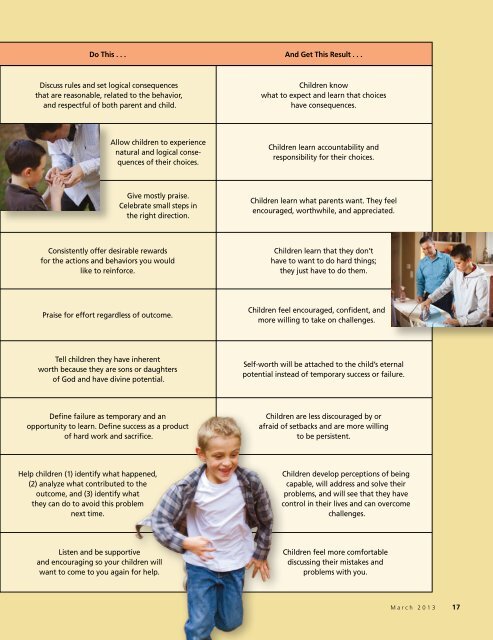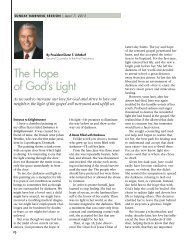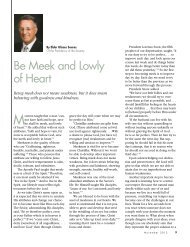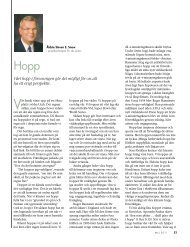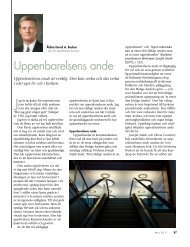March 2013 Ensign - The Church of Jesus Christ of Latter-day Saints
March 2013 Ensign - The Church of Jesus Christ of Latter-day Saints
March 2013 Ensign - The Church of Jesus Christ of Latter-day Saints
You also want an ePaper? Increase the reach of your titles
YUMPU automatically turns print PDFs into web optimized ePapers that Google loves.
Do This . . . And Get This Result . . .<br />
Discuss rules and set logical consequences<br />
that are reasonable, related to the behavior,<br />
and respectful <strong>of</strong> both parent and child.<br />
Allow children to experience<br />
natural and logical consequences<br />
<strong>of</strong> their choices.<br />
Give mostly praise.<br />
Celebrate small steps in<br />
the right direction.<br />
Consistently <strong>of</strong>fer desirable rewards<br />
for the actions and behaviors you would<br />
like to reinforce.<br />
Praise for effort regardless <strong>of</strong> outcome.<br />
Tell children they have inherent<br />
worth because they are sons or daughters<br />
<strong>of</strong> God and have divine potential.<br />
Define failure as temporary and an<br />
opportunity to learn. Define success as a product<br />
<strong>of</strong> hard work and sacrifice.<br />
Help children (1) identify what happened,<br />
(2) analyze what contributed to the<br />
outcome, and (3) identify what<br />
they can do to avoid this problem<br />
next time.<br />
Listen and be supportive<br />
and encouraging so your children will<br />
want to come to you again for help.<br />
Children know<br />
what to expect and learn that choices<br />
have consequences.<br />
Children learn accountability and<br />
responsibility for their choices.<br />
Children learn what parents want. <strong>The</strong>y feel<br />
encouraged, worthwhile, and appreciated.<br />
Children learn that they don’t<br />
have to want to do hard things;<br />
they just have to do them.<br />
Children feel encouraged, confident, and<br />
more willing to take on challenges.<br />
Self-worth will be attached to the child’s eternal<br />
potential instead <strong>of</strong> temporary success or failure.<br />
Children are less discouraged by or<br />
afraid <strong>of</strong> setbacks and are more willing<br />
to be persistent.<br />
Children develop perceptions <strong>of</strong> being<br />
capable, will address and solve their<br />
problems, and will see that they have<br />
control in their lives and can overcome<br />
challenges.<br />
Children feel more comfortable<br />
discussing their mistakes and<br />
problems with you.<br />
<strong>March</strong> <strong>2013</strong> 17


